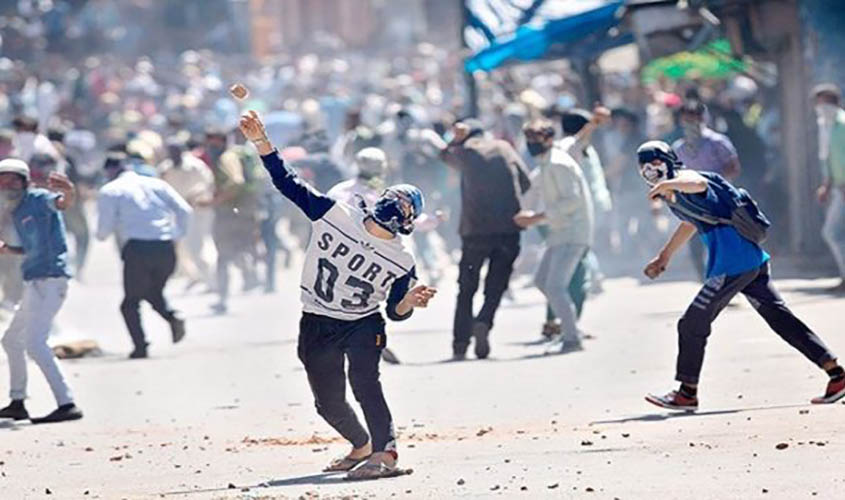In effect, security forces have been asked not to initiate combat operations, but not let down vigil.
The Ministry of Home Affairs’ unilateral direction to the security forces in Jammu & Kashmir to “cease fire” during the holy month of Ramzan has not been welcomed by the Pakistan-backed outfits, but has come as a relief to the common people of this disturbed part of India. It has been welcomed with caution. Markets have started functioning, with people being empowered to shop for essentials needed for the month of fasting. Students have been attending classes even in the hotbed town of Shopian, which has been a flashpoint since the slaying of the Hizbul Mujahdeen commander Burhan Wani in July 2016.
The ceasefire, which was announced on the eve of Prime Minister Narendra Modi’s visit to the state, has ignited hope amidst despair. The interactions which Centre’s interlocutor, former Intelligence Bureau chief Dineshwar Sharma has had with a cross-section of the state’s populace has indicated that if the government reaches out, there are enough people who are willing to grab the hand of peace and development. Experts on the state’s security situation like A. S. Dullat, Arun Chaudhary and former Army commanders have welcomed the move. Dissenting voices have been heard from some former Army personnel and surprisingly some tweets by serving officers have made their rounds on social media. Myopic vision of the complexities of Jammu & Kashmir tends to mire strategic thought.
Ceasefire is a bilateral concept. Terrorist groups have not reciprocated; separatist leaders have pooh-poohed the gesture. In effect, the Army and security forces have been asked not to initiate combat operations, but not let down vigil. They shall not commence any action, but retaliate if attacked. There have been provocations soon after the Centre’s announcement. And going by the experience of the similar exercise attempted during Atal Behari Vajpayee’s regime 18 years ago, the ceasefire is likely to see continuation of provocation from Pakistan-backed terror groups.
The ceasefire opens an opportunity for initiating confidence building measures with the civil population, especially the youth. This exercise has to be carried out in the state as well as in the rest of the country. Effort should be made politically to win over hearts and alienate the alienation of the people of J&K. Separatist leaders who have never tried to contest elections should be bypassed in order to reach out to the youth who are being misguided. The protesting youth must get a fair chance to vent their frustration through dialogue. Administration must become responsive.
Two recent happenings in the state highlight the malignancy. After his family was questioned by an Army commander for acquiring land and building a house close to the ammunition depot in Nagrota in Jammu region in violation of security rules, the Speaker of the State Assembly, Nirmal Singh, who till the other day was the Deputy Chief Minister, alleged that the Indian Army was “harassing people of the state”. BJP, the party to which this notable belongs, was quick to distance itself from his astonishing pronouncement. But the damage was done. If a leader belonging to the nation’s ruling party casts aspersions on the Indian Army then it adds grist to the propaganda mill of the separatists.
Another astounding development was an order passed by a government official, K. S. Sidha, that Kashmiri Pandits who had migrated from the valley as victims of terrorism needed to register themselves with the government if they wished to visit the Hindu shrine of Kheerbhawani in Tulmul near Ganderbal. The same applied to pilgrimage to the shrines in Tikkar (Kupwara), Manzgam (Kulgam) and Mattan (Anantnag). Furore in the local media drew the political leadership’s attention and the Mehbooba Mufti government rescinded the order asserting that Kashmiri Pandits are “sons of the soil” and thus need no permission to travel within the state. Such instances of harassment of citizens by acts of omission and commission of the civilian administration in the disturbed state add to the alienation of the populace, cutting across religions.
Since the 1972 Shimla agreement, India has treated J&K as a bilateral issue with Pakistan. Yet, Srinagar continues to host an office of the United Nations Military Observation Group for India & Pakistan (UNMOGIP), which was tasked with maintaining status quo on the 1949 Ceasefire Line, which ceased to exist post Shimla and now is known as Line of Control (LOC). Since 1965, the UN Security Council has not discussed J&K. Post 1972, India wanted UNMOGIP wound up, but Pakistan did not relent. For the summer months, UNMOGIP functions from Srinagar and during the winters its base is shifted to Islamabad. The presence of UNMOGIP in Kashmir is misused by propagandists who alienate the youth. The recent interaction between External Affairs Minister Sushma Swaraj, who corrected a Kashmiri youth who sought her help from Manila on Twitter and referred to “Indian Occupied Kashmir”, is a case in point. If Pakistan’s resistance comes in the way of winding up, India could insist that like Islamabad, the head office of this infructuous organisation is stationed in New Delhi (where a liaison office functions), so that this symbol of “J&K dispute” is removed from the valley.
A retired J&K cadre IAS officer, Sonali Kumar, in her recent book, Unmasking Kashmir has made startling revelations on corruption in the state administration, which she and her IAS officer husband witnessed during their tenure. She records an incident of stone throwing at Baramulla in 1980. Stone throwing has been part of Kashmiri protests since the Mughal era, the protestors are termed “Sanghbash” in the Kashmiri language. Incidents of stone pelting thus should not merely be treated with alarm, but viewed in the historical perspective. No stone should be left unturned in the effort to build confidence and bring the citizens of J&K into the national mainstream.

